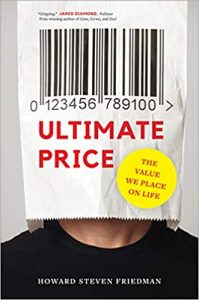The weeks are speeding past in a blur of Zooms. However, I’ve found time to read – alongside the rivalry, gore, sex and drama of Tom Hollander’s Rubicon – Ultimate Price: The Value We Place on Life by Howard Steven Friedman.
This is an unpromising subject in some ways: policies and regulations often place an implicit, or sometimes explicit, value on human life. How is that value determined? Is it consistent in different domains? What’s the fair and ethical way to make such judgments, which are inevitable when it comes to deciding which costly safety measures to enforce through regulation or whether to purchase an expensive drug for medical treatments, or how much to compensate crime or accident victims.
The short answers are that the value of life – even the dry-sounding Value of a Statistical Life – is inconsistently established and rarely debated. Monetary values and lives never feel like they belong in the same conversation. Rather, the issue is often the subject of industry lobbying and political horsetrading. Some regulations – eg environmental ones imposing costs on industry – are massively scrutinised. Others – eg extra airline security – are not. Some lives are valued at millions, others – including foreign civilians killed by drones, say – are not valued at all. Cost benefit analysis is sometimes uncomfortable, consistent cost benefit analysis even more so.
I picked up the book with a slight sense of duty as I do one lecture on this area, and can report that it’s very clear and well-informed. It has loads of thought-provoking examples. There is a US focus (health insurance) but the applications are wide. It will make a great supplementary read, giving students loads of examples to get them thinking and plenty of additional references. There isn’t as much as you might think giving an overview of these issues so I welcome this one and will add it to the reading list.


Diane,
I just found your blog for the first time and am absolutely in love. An amazing blog on econ, law, public policy. etc. I am currently working on a book about the intellectual history of growth within economics and would love your insights if possible in a blog post about your thoughts (given your extensive reading and work) on growth.
Also, given you have you reviewed so many books could you just create a reading list for the rest of us.